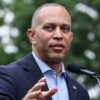NATO plays a crucial role in our nation’s defense—and there’s a strong case to be made for increased defense spending by all NATO allies. Those are the points Nile Gardiner, director of The Heritage Foundation’s Margaret Thatcher Center for Freedom, made in his recent testimony before the U.S. House Foreign Affairs Europe Subcommittee.
Gardiner is right: Today, NATO matters more than ever and demands renewed commitment from our allies in Europe.
Gardiner noted that “the United States has a significant national interest in supporting and strengthening the NATO alliance, which has been the beneficiary of a huge investment by U.S. taxpayers for over three quarters of a century.”
He further commented, “A secure Europe and a robust trans-Atlantic alliance, including the U.S./U.K. Special Relationship, advances the security of the American people.”
As NATO looks toward the future, protecting U.S. interests in Europe—especially in emerging partners in the continent—remains vital. A stable, secure, and economically viable Europe isn’t just good for Europe—it’s in America’s economic best interest too.
For more than seven decades since the signing of the treaty, U.S. military, diplomatic, and economic presence in Europe have contributed to European stability, economically benefiting both Europeans and Americans.
But this vital partnership cannot be “a two-tier alliance” in which the United States carries the overwhelming military burden for the defense of the free world while some European allies build vast welfare states.
Regrettably, many founding NATO members have prioritized welfare expansion over defense procurement, a shortsighted approach that has directly contributed to Europe’s current security crisis. Russia’s 2014 annexation of Crimea should have been a wake-up call; instead, it was met with half-measures and delayed commitments from key allies.
Russia’s 2022 full-scale invasion of Ukraine shattered any remaining illusions about European security. NATO’s collective security is only as strong as each member’s willingness to invest in it.
The issue facing NATO is not whether and when allied spending should rise. Spending must rise now, not as a future aspiration, but as an urgent means of correcting years of strategic neglect.
This renewed focus and commitment matters, given that NATO is the cornerstone of the transatlantic geoeconomic security alliance and practical partnership.
Going forward, the best way to sustain a strong base is from the bottom up. The foundation of transatlantic relationship requires advancing practical bilateral partnerships with emerging partners and allies in Europe. Now more than ever, the U.S. should double down on its efforts to deepen and broaden its European engagement in the areas of military, economic, and energy cooperation.
As Gardiner expressed in his testimony, “With bold US leadership at the helm, NATO still has the vision, capacity and energy to thrive and prosper for the next 75 years. But the long-term success of the alliance rests upon the willingness of all its member states to invest in their common defense and share the economic and military burdens that are necessary to keep the likes of Russia at bay. And the EU can never replace NATO.”
The role NATO plays today is as vital as it has ever been. The depth and breadth of the NATO alliance is the most powerful deterrent in the world to those forces that threaten the United States and our partners.
To improve cooperation and collaboration, NATO and the U.S. must work together to fine-tune their alliance via timely, forward-looking strategic clarity. The upcoming June 24-25 NATO summit in The Hague, Netherlands, provides the perfect opportunity to do just that.
































